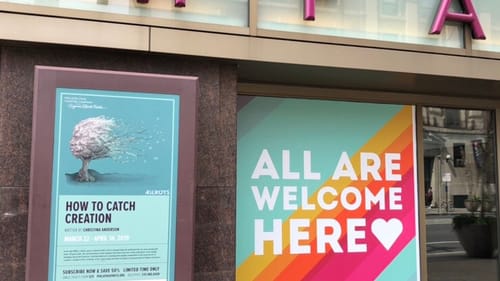Stay in the Loop
BSR publishes on a weekly schedule, with an email newsletter every Wednesday and Thursday morning. There’s no paywall, and subscribing is always free.
Not just conversations in rooms
A statement from Philadelphia Theatre Company and the authors of an open letter

Everyone who signed an April 9 open letter to Philadelphia Theatre Company (PTC) about its upcoming season of all-white playwrights knew what was going to happen next… but they also didn’t know. As the letter's coauthors, Elaina Di Monaco and Haygen-Brice Walker, release a joint statement with PTC (which you can read in full below), Walker speaks with BSR about the aftermath—and high hopes of a way forward.
“I definitely don’t regret the openness of the letter at all,” Walker says, but he’s working hard to accept his responsibility for the consequences—especially the ones he didn’t expect.
It was an emotional moment, he explains, and it was rushed. He didn’t plan to detract from the closing week of PTC’s How to Catch Creation, by Christina Anderson, a writer Walker loves and is happy to see represented on a Philly stage.
Quick consequences
After the letter went public, he says, practical consequences came quickly for him and Di Monaco as artistic collaborators. A donor to their scrappy theater collective, ON THE ROCKS, quickly contacted them to withdraw financial support. As Walker puts it, the donor objected to the pair publicly “tearing down” a member of their community.
He calls it a clear sign that “there are people who don’t want to change.”
Then a public Facebook post about the open letter from director Kevin Glaccum, a founder of Azuka, became a lightning rod for the controversy. The sentiments in that statement, Walker says, were exactly the kind of response the letter’s signers had anticipated. But what they hadn’t anticipated was the racism that poured in from the comments as many in the community tried to deny, silence, or ignore the experiences of marginalized artists.
“I was aware that there would be some feelings,” says Walker, a queer Latino artist, but he “didn’t think that it would manifest in the way that it did.”
For example, “it felt like people of color were being attacked for things that had nothing to do with the situation” or grilled about exactly which shows they had seen and where—instead of being allowed to speak to the bigger issue at hand. There was “a constant bullying of people of color,” he says, adding that some of those comments were subsequently deleted.

“Can of worms”
Later, Glaccum followed up with a public status offering “sincerest apologies” for his statement. “I can honestly say my ego got in the way of my better judgement by thinking some pronouncement from me would somehow adequately address an issue as complex and deeply felt as this one.” He regrets not taking a more active hand in addressing and suppressing the post’s inflammatory comments.
But for many in the community, particularly people of color, the damage was done. For his own part, Walker is working on “accountability that I own in all that racist shit that went down,” calling it a “can of worms that I opened.” Now, he needs to “navigate and come to terms with that for myself.”
Just because he, Di Monaco, and their cosigners made their statement didn’t mean that everyone affected by it had the same readiness to cope—and causing harm to marginalized folks was completely counter to the point of the original letter: “We didn’t think that part all the way through.”
What’s next?
Walker and Di Monaco each had a one-on-one meeting with PTC artistic director Paige Price on April 15.
“I feel like she really heard me,” Walker says. “Of course there were pieces of the conversation that were tough and awkward … [but] I think something good will come from this.”
Here’s the full text of a follow-up statement from Price, PTC managing director Emily Zeck, Di Monaco, and Walker:
On Monday, April 15, Philadelphia Theatre Company Artistic Director Paige Price met with the authors of the letter, Elaina Di Monaco and Haygen-Brice Walker. Both of them met separately with Price for face to face conversations. The talks were productive and cordial, and centered around Philadelphia Theatre Company’s season selection process and also around creating opportunities for underrepresented actors, directors, creative teams, and administrators. A subsequent meeting is being organized, where the signers of the letter will meet in person with additional members of PTC's leadership, to discuss how PTC can develop diversity and inclusion initiatives that can drive change. We also discussed a shared goal of expanding the conversation to other artists and artistic leaders in the city. We look forward to continuing positive conversations about the way forward.
The next step, Walker says, is a meeting in May (date TBD) that will get as many of the letter’s signers as possible into the room with Price, Zeck, and other leaders of PTC. Price declined to make any additional comment at this time.
“We don’t just want to have conversations in rooms,” Walker says. “We want some changes”—trackable, tangible shifts that the community can witness. But for now, he says, he feels good about where things are headed and about his conversation with Price.
“I left it feeling really hopeful.”
Sign up for our newsletter
All of the week's new articles, all in one place. Sign up for the free weekly BSR newsletters, and don't miss a conversation.

 Alaina Johns
Alaina Johns